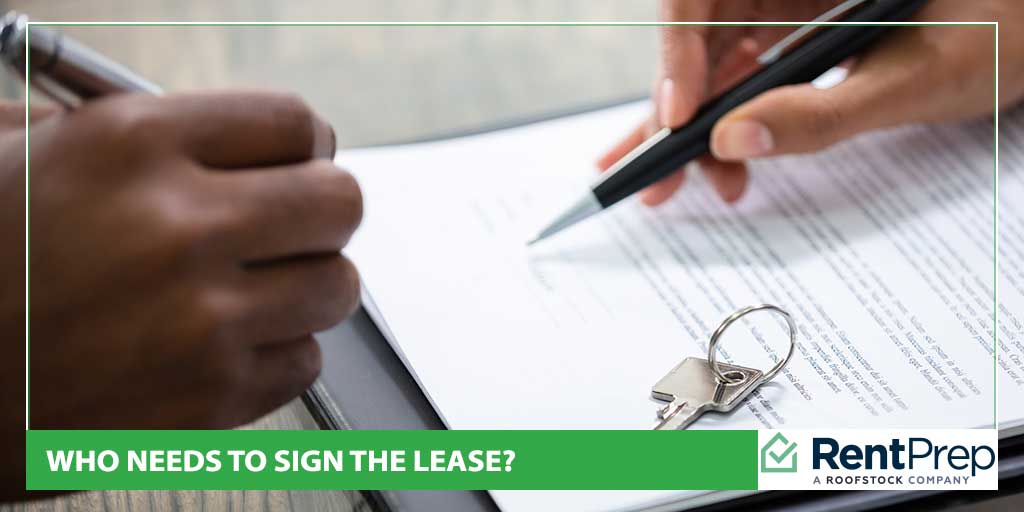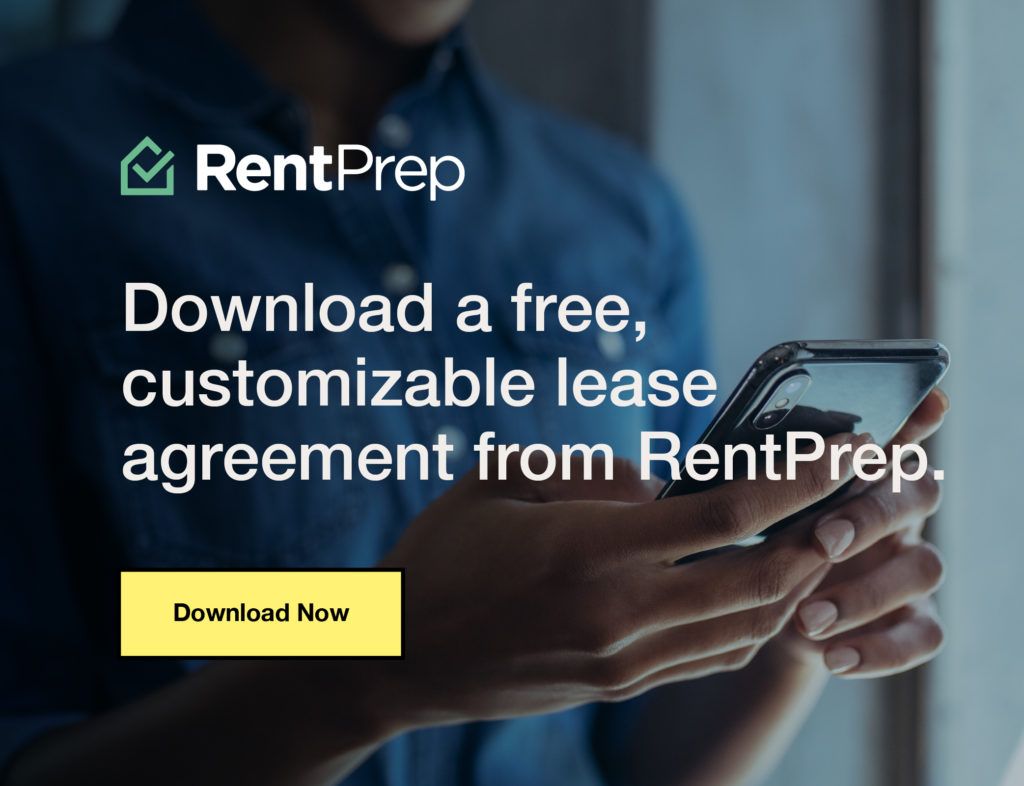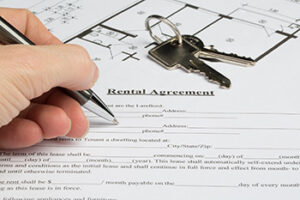
Navigating lease signings involves understanding who needs to be on the lease, from minors to adult children, and the implications of each.
Key Takeaways:
- Legal tenants are those of legal age who sign the lease.
- Minors should be listed as occupants, not tenants.
- Adult children (18+) should be on the lease for legal clarity.
- Co-signers add security for landlords and are part of the lease.
- Lease agreements protect both landlords and tenants.
- Special considerations are needed for minors turning 18 during the lease term.
“Does everyone living in an apartment have to be on the lease?” is an often-asked question. The answer is that it depends. Is everyone over 18? Are they minors? What does the lease say? Lease signing can get confusing with the different variables, including age, state laws, and co-signers.
In this post, we will answer all the commonly asked questions about who signs a lease.
Table of contents for Who Needs to Sign the Lease?
- Who Signs an Apartment Lease?
- How Old Do You Have to Be to Sign a Lease?
- Is a Child Considered a Tenant?
- Do Adult Children Need to Sign a Lease?
- What If a Minor Turns 18 While a Family is Renting?
- Co-Tenant Addendums: What You Need To Know
- What Are Co-Tenant Rights?
- FAQs on Who Signs a Lease
- Who is a Lease Designed to Protect?
- Who Signs the Lease First: the Tenant or the Landlord?
- Do All Tenants Need to Sign the Lease?
- Can Someone Live With You Without Being on the Lease?
- Can Someone Be on the Lease and Not Live There?
- Do Co-Signers Have to Be on the Lease Agreement?
- Can a Leaseholder Kick Out an Occupant?
Who Signs An Apartment Lease?
A person who signs a lease is called a lessee. When signing lease agreements, the lessee is typically the tenant. The person who leases or lets a property to another is known as a landlord.
A landlord recently posted in the RentPrep For Landlords Facebook Group about signing leases. This is just one example where a landlord is trying to do the right thing but needs to know what they can and can’t do regarding who is on the lease.
There always seems to be confusion around who should be signing a lease. It’s a good idea for everyone of legal age to sign the lease. We’ll go over just what that means and specific scenarios below.
 How Old Do You Have To Be To Sign A Lease?
How Old Do You Have To Be To Sign A Lease?
You can rent an apartment at the age of 18. The only way to lease an apartment earlier would be if the child were to become legally emancipated from their parents. Emancipation of minors is a legal mechanism by which a minor is freed from control by their parents or guardians, and the parents or guardians are freed from any responsibility toward the child.
If a child is legally emancipated, there are still laws at the state level that determine what they can and cannot do. This resource from Cornell.edu has more information on the state level.
As mentioned, minors are not considered tenants and do not have to be on the lease. They can be listed as occupants if state laws allow but cannot sign the lease. If a landlord has a minor sign a lease, it won’t hold up in court as a viable contract since the minor is not considered an adult.
Is A Child Considered A Tenant?
A child is considered anyone under 18 in the United States. A child is not a tenant and is regarded as an occupant until they reach the age of 18.
A child occupant may be listed on the lease as an occupant under 18 years old but should not have to sign anything nor be listed as a tenant.
Children living in the rental should be listed as occupants and should not be signing a lease if they are under 18. During the application process, a landlord should not inquire about children in any way, as familial status is a protected class under the Fair Housing Act.
Do Adult Children Need To Sign A Lease?
Adult children (age 18 or older) should be listed on the lease, and they should sign the lease as well. If an adult child does not sign the lease, there are risks for the landlord and the adult child.
The risk for the landlord is that there is one less responsible party on the lease. The lease rules wouldn’t bind the adult child, making enforcing those rules more difficult.
The risk for the adult child is that they’re considered a guest instead of a tenant. If problems arise, removing the adult child from the premises will be much easier.
Of course, landlords need to treat adult children of existing tenants as adults legally, but adjust their expectations accordingly to reflect the reality of the situation. While these new adults should indeed be listed on the lease agreement, most new adults will only know a little about leases, rental agreements, and more, and they will trust their parents and sign where they are told.
However, having an adult child sign the lease agreement or an addendum can help landlords and parents keep adult children in line and responsible for their behavior and their guests.
What If A Minor Turns 18 While A Family Is Renting?
A standard lease tends to be a 12-month lease. If an occupant turns 18 during the lease, it’s typical to address the situation when it is time for a lease renewal.
You can have the 18-year-old sign the lease as an adult tenant at lease renewal. This is important because you’ll want to update and run background checks yearly on your tenants as life circumstances may change. A landlord should know if the 18-year-old tenant has a record or is considered a high-risk tenant.
You can create a co-tenant addendum when the child turns 18.
Co-Tenant Addendums: What You Need To Know
A co-tenant addendum adds the child as an adult tenant, like a roommate. It requires a full background check for the new addition, copies of identifying documents, and a written statement that the new adult will abide by all lease agreement terms, including financial terms.
When To Add A Co-Tenant Lease Addendum
A co-tenant lease addendum is the best way to handle when a tenant’s child turns 18. The addendum should cover the period from the child’s birthday to the renewal of the existing lease agreement.
When landlords see that the minor child is about to turn 18, it’s appropriate to send the tenant a written notice that they and their child will need to complete some new paperwork for a co-tenant lease addendum within two to three weeks after that child’s birthday.
Setting up the lease addendum with the tenant and their adult child is an excellent way to ensure everyone is on the same page regarding responsibility for rent, security deposits, damage, and following the rules.
Why Should You Add A Co-Tenant Lease Addendum?
A co-tenant lease addendum means that if the original tenant fails to pay rent, the landlord can seek compensation from any other adults named in the lease agreement. It also means that if the landlord seeks out the costs to repair damages to the rental property, they can collect from the new adult.
The addendum should also be clear that the co-tenant didn’t contribute to the original security deposit and, therefore, has no rights to deposit refunds—only the original tenant can receive funds back. There should be no language about whether or not the new adult should pay rent–that’s between the tenants, as long as the landlord gets the total amount on time and every month.
What Are Co-Tenant Rights?
Once a young adult is added as a co-tenant, they cannot be forced out of the rental property by any other means except a legal eviction process. A young adult tenant cannot be evicted for just any reason, either. Like every other tenant, a landlord may only evict them based on a breach of the lease agreement. Remember, a landlord cannot just evict one tenant and not the others on a lease agreement–it’s all adults or none of them.
The co-tenant lease addendum should last until the lease agreement expires and the current tenants want to renew. When the lease is ready to renew, the landlord can decide whether to allow just the parents to reapply or include the young adult in the renewal process. Landlords will have to determine what standards to set for adult children. In other words, if the parents are good tenants and continue to meet the criteria, but the adult child has no credit history and a weak job history, the landlord may well allow things to continue as they are and lower their application standards for the adult child, given the special circumstances.
Of course, landlords can go the other way and stick strictly to their criteria, which an adult child won’t meet. In that event, the parents must decide whether to sign the lease without the adult child or go elsewhere. As with most cases requiring landlord decisions, it often depends on the parents, the adult child themselves, and many other factors.
Beware Of Co-Tenant Local & State Laws
Landlords should beware, however, because, in some municipalities, such as San Francisco, laws protect tenants who live in a rental property as minors and then choose to stay after they come of age. As an original lawful occupant, the new adult may have some rights, so landlords should know whether this condition applies in their city.
The Reality Of Collecting Rent From Adult Children
Landlords must remember that although the new adult is technically legally as responsible as the original tenant, in most cases, it will be nearly impossible to collect rent from the tenant’s child. Many landlords are okay with adding the new adult to the lease agreement but don’t hold out hope of collecting from them if anything goes wrong because they realize the tenant’s child’s improbability of providing any financial contribution to the situation. However, landlords are well within their rights to try.
All in all, landlords should handle the adult child of a current tenant to create the best legal coverage for themselves and their property, but understand that the realities of enforcing or collecting will be somewhat different. While grown children should be treated on paper as the adults they now are, they are, in many ways, still children. Of course, what is done on paper protects the landlord and the rental property. What the landlord does if and when it comes to collections is something that each landlord must decide for themselves.
Legally, the landlord can require all the same things of the adult child as any other adult on the lease, but as a realistic landlord, it is usually the right thing to do to take a specialized approach to a special situation.
FAQs On Who Signs The Lease
Signing a rental contract can confuse both a landlord’s and tenant’s sides of the house. Whether you’re a tenant and have someone live with you, not on the lease or a landlord who is not sure when the right time is to sign a lease, RentPrep has you covered. Here are a few of the most commonly asked questions when it comes to everyone in an apartment has to be on the lease.
Who is a Lease Designed to Protect?
Sometimes, a tenant may view a lease only as landlord protection, but that is not the case. The lease protects the tenant as well.
If issues arise, the lease is the contract that will determine how those issues are handled.
The lease should address whether or not every occupant needs to be on the lease. Every person responsible for paying rent must sign the lease, and it’s a good idea to have any occupant considered to be of adult age sign the lease as well.
If a tenant sneaks someone into the rental, they create additional liability for themselves, and that guest is not afforded the same rights as the tenants responsible for the lease.
Who Signs the Lease First, the Tenant Or the Landlord?
So, what’s the standard practice for who signs a lease first? Often, we’ll see that a consumer is usually the one signing any legally bound contract first. In a rental agreement, the tenant often signs the contract first since the tenant is considered the consumer.
Do All Tenants Need To Sign The Lease?
If they’re considered a tenant, the answer is yes; they should sign the lease. A tenant is of legal age, whereas an occupant (such as a minor) may be listed on the lease agreement but does not sign the lease.
Can Someone Live With You Without Being On The Lease?
Not everyone living in an apartment must be on the lease. Legal tenants, typically those over 18, must sign. Minors are listed as occupants and do not sign. Adult children and co-signers should also be on the lease for legal and financial clarity.
Any adult roommate is strongly recommended to be a signed party on the lease. A tenant with a roommate who is not on the lease creates unnecessary liability for themselves.
For example, if the roommate causes $1,000 worth of damage, the landlord will charge the tenant for those damages. The people who sign the lease are responsible for rent, damages, and other items spelled out.
A renter having a long-term guest at the rental, such as a girlfriend who has moved in and is not a party on the lease, only increases their liability.
Can Someone Be on the Lease and Not Live There?
Sometimes, an individual named on the lease may not reside in the property. This can occur in situations like parents leasing an apartment for their college-going child or someone renting a property for work-related purposes but residing elsewhere. Landlords should be aware of these situations and ensure their lease agreements are structured to address the responsibilities and expectations of non-resident leaseholders.
Renting an apartment for a family member is a common scenario, particularly for parents renting for college students or elderly family members. In these cases, the person renting the apartment should understand that they are legally responsible for all aspects of the lease, even if they are not the primary occupant. Landlords should ensure that their lease agreements and tenant screening processes accommodate such arrangements, clarifying the responsibilities of the person renting on behalf of the family member.

Do Co-Signers Have To Be On The Lease Agreement?
As the name suggests, a co-signer should sign the lease as an added level of security for the landlord.
A co-signer is typical when the renter has no rental or credit history (common amongst college students). The co-signer is legally responsible for paying for any rent or damages from the tenant.
This added insurance allows a younger renter to find housing without the landlordfeeling exposed to a risky tenant. The co-signer must sign the lease for this reason.
Can A Leaseholder Kick Out An Occupant?
If the occupant is legally considered an adult and is not a signed party to the lease, then the leaseholder can kick out (or evict) the authorized occupant.
Don’t Overcomplicate Lease Signings
It’s important to remember that not every lease is perfect. Often, a landlord might forget that a tenant has a child turning 18 in the next few months or fail to check the rental property for unwanted roommates who are not on the lease. Whatever it is, addressing the problem once you find it – without overcomplicating things – is essential. To lessen the stress of finding great tenants for your rental, check out RentPrep’s tenant background check services.


 How Old Do You Have To Be To Sign A Lease?
How Old Do You Have To Be To Sign A Lease?
